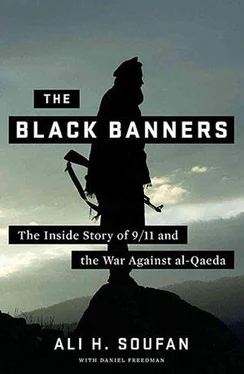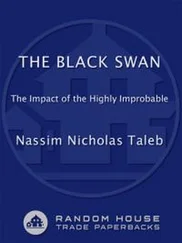To this day I vividly remember, down to minute details, Palestinian militants pulling up in jeeps outside homes in our neighborhood, swinging their machine guns toward the occupants, and ordering them to hand over their car keys. People had no choice but to obey, as there was no effective police force to appeal to for help.
A few months after my conversation with Joe, there was a career fair, and the bureau had a booth, reminding me of the bet. A few days later I decided to send in an application—more out of curiosity than anything else. I still didn’t know much about what the bureau did, beyond the conventional knowledge and what I’d “learned” from some social science classes, movies, and, of course, the television shows. But after I submitted the application, I spent some time researching the FBI.
The information was mostly new to me. I discovered that the bureau was created in 1908—given its prominence today, I had thought it would have been around longer. I also learned that only under J. Edgar Hoover had it been built into the powerful law enforcement tool it is today, which makes the bureau’s successes and reputation even more impressive. The application process includes tests of all sorts, from physical to aptitude, along with lots of interviews, often spaced out over months. As I jumped through the hoops, my friends started a pool betting on how long I’d last.
During the polygraph tests—while I was hooked up to the machine—the polygrapher asked: “Have you ever done anything that would embarrass you if your mother knew about it?”
“Yes,” I replied, which puzzled him: it was not the answer he was expecting. I jokingly explained to him that the machine probably wasn’t programmed to take in how strict the ethics of a Muslim mother can be.
After completing the long series of interviews and tests, for almost a year I didn’t hear anything from the bureau, and I began to think that my application had failed somewhere and that they had forgotten to notify me. It didn’t bother me too much, as applying to the bureau had been more a source of amusement than anything else, and I certainly hadn’t been basing my future on the FBI. I was planning on a career in academia, and as I was finishing up at Mansfield, I had applied to do a master’s degree in international studies at Villanova University. By the time I was at Villanova, I had almost completely forgotten about the bureau, and so it was a surprise to receive a letter of acceptance as I was finishing and preparing to move to England to pursue a PhD. I went back and forth in my mind as to what to do, with friends and family divided in their recommendations. Ultimately the bureau’s offer was too tempting to pass up. The idea of being an agent appealed to my sense of adventure, as did the chance to help protect America, a country I had come to love dearly. I loved it because of the welcome it had given me and my family and because, having grown up in a country pulled apart by sectarian discord, I had come to appreciate the greatness of the United States and admire the ideals that had created the nation.
I was fascinated by the protections the U.S. Constitution provides citizens. While the Constitution and the Pledge of Allegiance may perhaps seem largely symbolic to many Americans, to those of us who have lived with alternatives, they are filled with meaning. I know that the protections offered therein are very necessary.
The idea of being part of something bigger than me prevailed. I accepted the offer, and, in November 1997, after sixteen weeks of training at the FBI Academy, in Quantico, Virginia, I joined the bureau as a special agent, assigned to the New York office.
The FBI’s New York field office, located in downtown Manhattan, in many ways resembles the city in which it is housed: it’s full of colorful characters who are not afraid to voice their opinions and for whom politeness is often an unnecessary convention that gets in the way of making a point. The bluntness, the jokes, and the camaraderie of the NYO were, to me, far more appealing than the cold and formal atmosphere of many offices.
I did have an advantage over other out-of-towners in my ability to adjust, however. While New York City was entirely different from the rural Pennsylvania that had been my home in previous years (and which I loved), the lively characters did remind me in different ways of some of the interesting figures of my childhood in Beirut, and this helped me feel at home. Before new recruits are assigned to specific squads, they rotate through different sections of the office, starting with the applicants’ squad (conducting background checks), then moving on to special operations (doing surveillance), and finishing at the command center—ensuring that newcomers gain an understanding of all the work the office does. This boosts camaraderie between squads and efficiency for the bureau as a whole, with everyone coming to know the roles and capabilities of other teams. It is also meant to help the recruits see which squads appeal to them, and it gives senior management a chance to see rookies at work before deciding where to place them.
Through the rotation period we met senior agents from different divisions who gave us advice and explained what their groups did. What most interested me was counterterrorism, and the senior people in this area whom I met were Pat D’Amuro, assistant special agent in charge (ASAC) of counterterrorism, and John O’Neill, who was Pat’s superior, running the entire National Security Division.
In college I was always interested in the effects of nonstate actors on global stability. My experience in war-torn Lebanon shaped my view that groups like the Irish Republican Army, Hezbollah, the Palestine Liberation Organization, and Hamas can be more influential than the states themselves in setting political and security agendas. My graduate research focused on the cultural approach in international relations. Most of my professors were students of the realism school, which maintains that a country’s national interest is central to how it acts, but I always believed that realism in many ways is shaped by the cultural lenses of different peoples. My research developed into a hobby, and gradually led me to follow the activities of a Saudi Arabian millionaire named Osama bin Laden.
What piqued my interest was reading newspapers from the Middle East. I kept up with them in order to stay up to speed on my Arabic and because I obviously retained an interest in the region. Bin Laden’s name often appeared; there was a fascination with him among many in the Middle East, as he had given up a life of privilege to go fight with the mujahideen against the Soviet Union in Afghanistan and had then maintained the life of a fighter.
Over time I noticed bin Laden’s declarations toward the United States growing increasingly aggressive, and it became clear to me that someone with his pedigree and resources was going to be very dangerous someday. I began following him more seriously, turning him from an academic interest into part of my job: actively searching the Arab media for his name and keeping a folder of interesting articles about him.
Bin Laden was the seventeenth child (out of an estimated fifty-four) of Mohammed bin Awad bin Laden, a household name in much of the Middle East. Born to a poor family in the south of Yemen, Mohammed had moved to Saudi Arabia, working as a porter before starting his own construction business. He built a reputation as a good builder and attracted the attention of the Saudi royal family, which began using him for their projects. Commissions started with roads, then moved on to palaces, until he was given the highest honor: renovating the Grand Mosque—al-Masjid al-Haram—in Mecca.
While Mohammed had a reputation for integrity in business, in his personal life he was more lax. He married a total of twenty-two women, often “marrying” and divorcing in a single day, as Islam forbids more than four wives at a time. Osama was the product of Mohammed’s tenth marriage, to a Syrian woman named Hamida al-Attas; he was born on March 10, 1957.
Читать дальше












